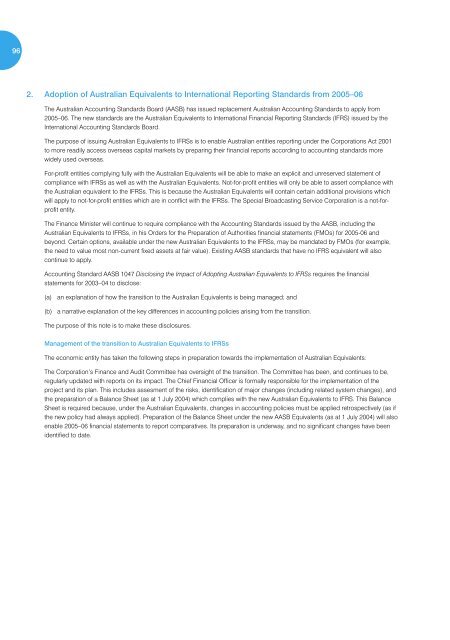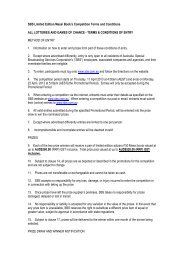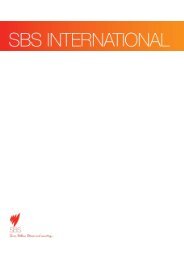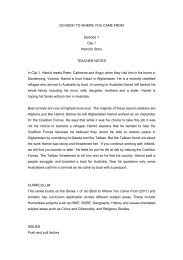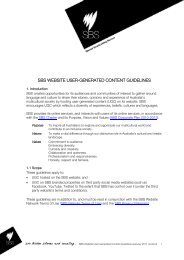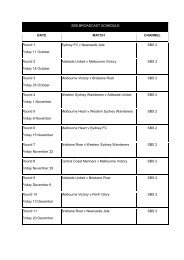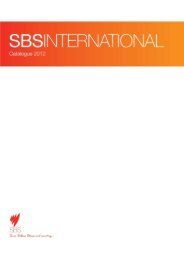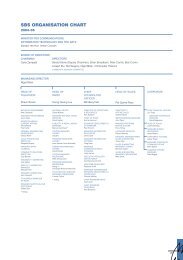2003 - 04 Annual Report - Sbs
2003 - 04 Annual Report - Sbs
2003 - 04 Annual Report - Sbs
- No tags were found...
Create successful ePaper yourself
Turn your PDF publications into a flip-book with our unique Google optimized e-Paper software.
962. Adoption of Australian Equivalents to International <strong>Report</strong>ing Standards from 2005–06The Australian Accounting Standards Board (AASB) has issued replacement Australian Accounting Standards to apply from2005–06. The new standards are the Australian Equivalents to International Financial <strong>Report</strong>ing Standards (IFRS) issued by theInternational Accounting Standards Board.The purpose of issuing Australian Equivalents to IFRSs is to enable Australian entities reporting under the Corporations Act 2001to more readily access overseas capital markets by preparing their financial reports according to accounting standards morewidely used overseas.For-profit entities complying fully with the Australian Equivalents will be able to make an explicit and unreserved statement ofcompliance with IFRSs as well as with the Australian Equivalents. Not-for-profit entities will only be able to assert compliance withthe Australian equivalent to the IFRSs. This is because the Australian Equivalents will contain certain additional provisions whichwill apply to not-for-profit entities which are in conflict with the IFRSs. The Special Broadcasting Service Corporation is a not-forprofitentity.The Finance Minister will continue to require compliance with the Accounting Standards issued by the AASB, including theAustralian Equivalents to IFRSs, in his Orders for the Preparation of Authorities financial statements (FMOs) for 2005-06 andbeyond. Certain options, available under the new Australian Equivalents to the IFRSs, may be mandated by FMOs (for example,the need to value most non-current fixed assets at fair value). Existing AASB standards that have no IFRS equivalent will alsocontinue to apply.Accounting Standard AASB 1<strong>04</strong>7 Disclosing the Impact of Adopting Australian Equivalents to IFRSs requires the financialstatements for <strong>2003</strong>–<strong>04</strong> to disclose:(a) an explanation of how the transition to the Australian Equivalents is being managed; and(b) a narrative explanation of the key differences in accounting policies arising from the transition.The purpose of this note is to make these disclosures.Management of the transition to Australian Equivalents to IFRSsThe economic entity has taken the following steps in preparation towards the implementation of Australian Equivalents:The Corporation’s Finance and Audit Committee has oversight of the transition. The Committee has been, and continues to be,regularly updated with reports on its impact. The Chief Financial Officer is formally responsible for the implementation of theproject and its plan. This includes assesment of the risks, identification of major changes (including related system changes), andthe preparation of a Balance Sheet (as at 1 July 20<strong>04</strong>) which complies with the new Australian Equivalents to IFRS. This BalanceSheet is required because, under the Australian Equivalents, changes in accounting policies must be applied retrospectively (as ifthe new policy had always applied). Preparation of the Balance Sheet under the new AASB Equivalents (as at 1 July 20<strong>04</strong>) will alsoenable 2005–06 financial statements to report comparatives. Its preparation is underway, and no significant changes have beenidentified to date.


